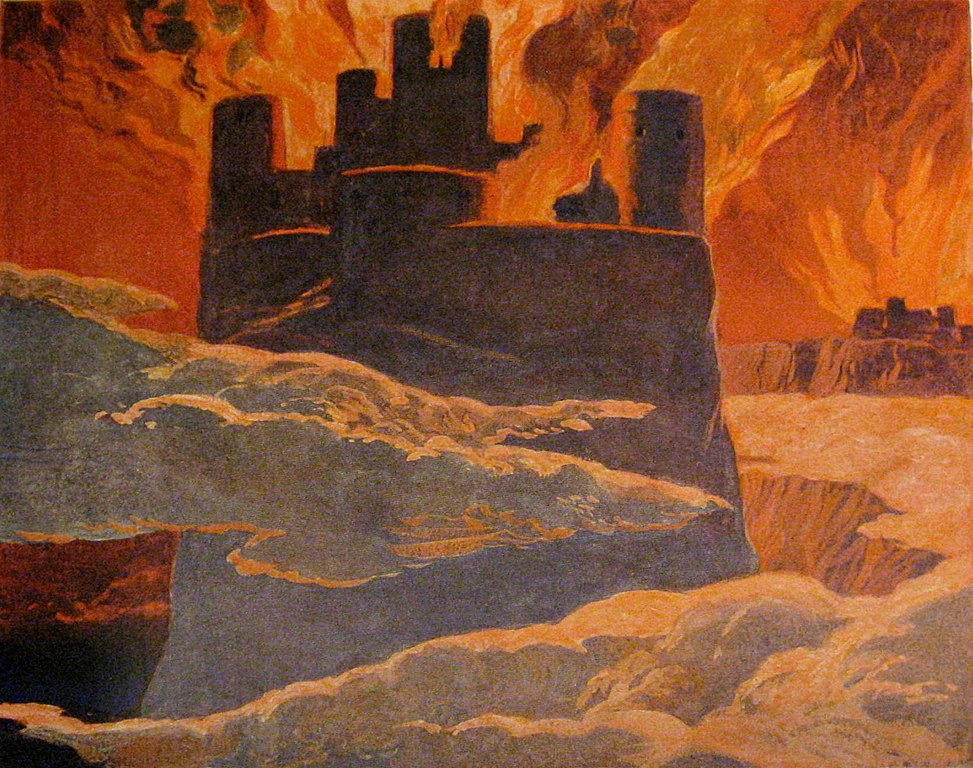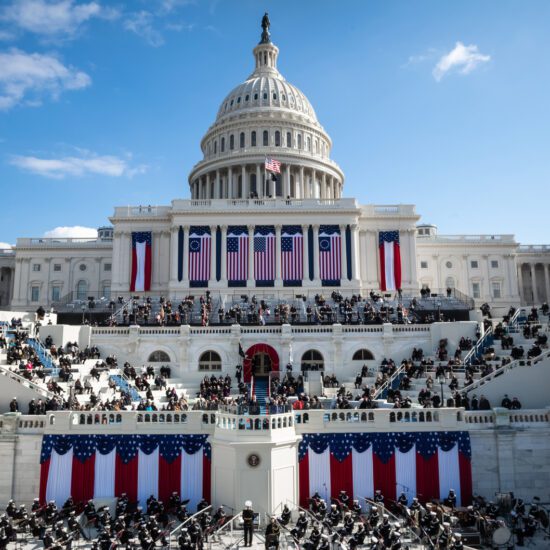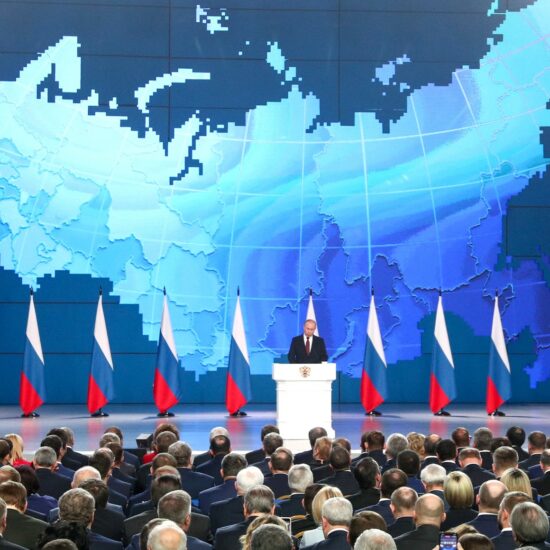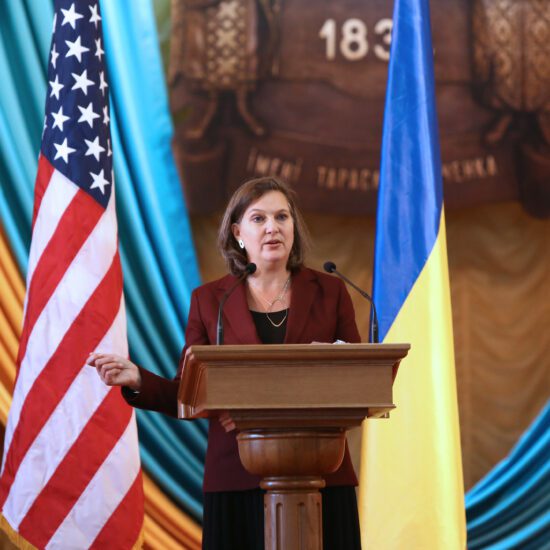
Image credit: Emil Doepler
We Americans have long labored under the conceit that our world relations are guided by an Enlightenment polarity between ‘realism’ vs. ‘idealism’. We are actually moved, however, by deeper currents in the national ethos. America is a religion, so said Robert Bellah. A “civil religion,” in his words, but a real and true religion nonetheless.
Religions of course have a theology and a church that is the domain of the clergy. Yet, (nationalized) religions also tell stories that move the People to fight and even sacrifice, as brother citizens, for the very idea of the nation. Call such stories the nation’s sacred narrative: narrative, as in script; sacred as in scripture. Great nations have powerful narratives–and, in times of crises, they are often tempted to follow the stainless guidance of their national scripture.
But such narratives can prove dangerous for their tellers, and America’s sacred story—so sanctimonious and imperious that it makes her about her missionary role in the world—may ultimately prove her greatest weakness. Americans see the world through the ironclad lens of the messianic testament of the ‘Redeemer Nation‘. We have rarely denied this sacred impulse, and it has led us into every one of America’s wars—bringing us both glory and disgrace, victory and disaster.
American Progress (1872) with Columbia, a personification of the United States. Image credit: John Gast
Two centuries of blindly following this prime directive ushered the United States’ single transcendent triumph—its victory in World War II. Elsewhere, however, the American scripture has consistently led to strategic failure: Reconstruction, Cuba (twice!), the League of Nations, Iran, Central America (many times!), Vietnam, the Middle East wars, and Afghanistan.
Whether sacred or profane, literature is still literature. Hence, scriptural plot elements are required, as they are in television, to work together and in unison tell a story. In American scripture, these tropes are as tightly woven, and as intimately familiar, as any of the classics of world literature.
Now it seems the ‘crisis’ in Ukraine beckons as yet another story arc in our long-running national TV series—less a sequel than simply the latest season in a streaming series: for America’s sacred narrative is organized around four universal and unchanging motifs, each of which is present in the latest season-opener now airing:
- Dr. Evil — The enemy we face is evil, and evil must be personified. When rebels pulled down the gilded lead statue of George III on July 9, 1776, they were celebrating the ancient Roman rite of Damnatio Memoriae: Symbolically executing the overthrown emperor by destroying his sacred, legionary imago (a gilded, 3D portrait). In contrast, during the long Civil War era, the enemy was more like “the Dark Side of The Force” — “The Slave Power” — or the evil mirror of Ezra Stiles’ “God’s American Israel.” This trope was extended to Spanish rule in Cuba, which did not abolish slavery until 1880. The Dark Side metaphor continued through World War I, with preacher Wilson’s damnatio of “Prussian Militarism.” (The popular official epithet — “Halt the Hun!” — was actually tinged with racism.)
After the brutal Treaty of Versailles, American attitudes toward Germany softened. In 1941 — with 25% of Americans of enemy descent — creating an evil Germany and Italy was no longer realistic. Evil had to once again be incarnated as ‘Dr. Evil’ — this time personified by Hitler and Mussolini.
As a mainstay of America’s sacred narrative, the ‘personification of evil’ motif has only become more pronounced in the post-WWII era. Stalin of course fit the profile to sheer perfection, as did Mao. And, Communist Party rule allowed for this designation to be expanded, ever more broadly, to include all their henchmen and their entire regimes. Most crucially, however, such a taxonomy allowed the clergymen of U.S. foreign policy to exempt the vast majority of the enemy people as downtrodden serfs, oppressed by tyranny and yearning for liberation. As Frank Baum tells us in The Wonderful Wizard of Oz :
[The Wicked Witch] has held all the Munchkins in bondage for many years, making them slave for her night and day. Now they are all set free and are grateful to you for the favor.
Even the soldiers yearn for liberation, and may be redeemed. After slaying the Wicked Witch (in the 1939 film), the Winkie (Pseudo-Cossack) Guard Leader declares: Hail to Dorothy! The Wicked Witch is dead! We see here how deeply coded the sacred narrative is, permeating even America’s most popular literary and cinematic works.
Through the decades, our chosen Dr. Evils have grown to become an ensemble cast, including Fidel Castro, Muhammar Qaddafi, Saddam Hussein, and Osama Bin Laden — a Darkside Legion! — to name just a few. But, these have proved mere child’s play—for America craves, above all, an existential Manichaean enemy. After all, it is the gravest threats that bring the sweetest victory.
Hence, Dr. Putin has lately stepped into well-heeled soles. Indeed, like the Wicked Witch or Joseph Stalin, Putin’s public persona—painstakingly curated by him for maximum mythic impact — is entirely congruent with America’s embedded Dr. Evil meme, meeting and exceeding expectation at every turn.
Therefore, there is no doubt—in the monolithic eye of Washington’s credentialled experts—that our new Great Dictator is simply a bully, motivated by avarice and cupidity alone. And, once this judgment is collectively canonized, echo chambers prevail, and establishment analysis is flash-frozen into dogma. We cease to inquire into the actual thinking of our (self-appointed) nemesis—all that is needed is moralistic judgment.
- America the Redeemer — The perfect encapsulation of America’s self-professed divinely ordained duty to rescue and liberate mankind (and punish the wicked) is contained in the sophomoric inaugural address of John F. Kennedy that became the crux of the Kennedy doctrine:
Let every nation know, whether it wishes us well or ill, that we shall pay any price, bear any burden, meet any hardship, support any friend, oppose any foe, in order to assure the survival and the success of liberty.
From Julia Ward Howe — “let us live to make men free” — to Samantha Power — “Responsibility to Protect” (R2P) — the narrative of ‘our sacred obligations to liberating humanity’ remains America’s unbroken chain. Our latest Muse of Liberty, Anne Applebaum, now commands us to be staunch, and stanch the blood of history by easing the pain of Ukraine: “We could start with this,” she smugly if nonchalantly declares, “help make Ukraine the successful, prosperous, Western-facing democracy that Putin so clearly fears.”
In many respects, this doctrine of Redeemer Nation is rooted in America’s Civil War transformation. Before the Abolitionist Crusade, the United States was a polity dominated by the slave-owning Confederate states, which would have rendered absurd any claim by the U.S. as to its privileged access to divine justice. America’s burgeoning ambitions thus took the form of nationally mandated territorial expansion via “Manifest Destiny”—in which America would tame a savage wilderness in the West and bring a superior protestant civilization to the corrupt Spanish lands of Florida, Mexico, and the Caribbean.
As such , the Civil War amounted to an American metamorphosis. Henceforth, the American Mission would be premised on redemption rather than subjugation: to liberate the oppressed, to civilize the heathen, and to make of them proper Americans (at least in spirit). The uplifting doctrine of Reconstruction — although only fleetingly implemented in the former Confederacy, would soon be extended to Cuba and the Philippines, and then (at least in missionary intent) to China.
1899 US political cartoon of Uncle Sam ‘schooling’ occupied nations in the wake of the Spanish-American War. Image credit: Louis Dalrymple
The full dagger of American colonialism and imperialism has always been cloaked under the illustrious garb of tutelage and schooling: professing to save and then raise up those many millions who had for so many centuries been condemned to ignorance and servitude with the promise of education but delivering instead liberal indoctrination and Western social engineering.
- Democratism: If liberty is the central teaching of the American civil religion, then democracy is its sacred prayer or talisman. It is both battle cry and banner. Akin to the لَا إِلٰهَ إِلَّا الله مُحَمَّدٌ رَسُولُ الله on the Saudi flag, this single holy word captures and broadcasts the essence of America’s divine mission.
Indeed, as a codeword for the American mind, democracy is a notion used to espouse multiple meanings at once: 1) that democracy is the sure sign of progress, the mark of God’s Will for the human future, and of “broad, sunlight uplands,” or more plainly, the Millennium; 2) that the quest for democracy unites the democrats around the world against autocrats and creates between them and Americans bonds of brotherhood–making them America’s kin; 3) that the world is sharply divided into democracies and dictatorships: a threat against one is a threat against all; and 4) America’s prime directive is the defense and promotion of democracy around the globe.
An astute observer would perhaps notice that ‘democracy’ then is not simply a holy word. It is also a cultural codeword packed with sacred content. Always understood by true believers, it is never formally explicit—enunciation is always enough—as long as one could show their membership badge.
The sacred narrative wields its power as a single word. If what every American should know by heart—as in the case of America’s R2P vis-à-vis Ukraine—need still be explained, then all it takes is to recite (from memory) just a few key verses, as does Mike Turner (R-Ohio—future Intel Committee Chair) in this TV interview:
Ukraine is a democracy … Russia is an authoritarian regime seeking to impose its will on a validly elected democracy … We’re for democracy. We’re for liberty. We’re not for authoritarian regimes coming in and changing borders by tanks … We need to make sure we’re on the side of democracy.
- The Specter of Sin — Finally, the scriptural arc of America’s sacred narrative builds to its climax through a formula of recognition, remorse, and repentance. America’s commitment may waver and even, initially, fail; yet the nation eventually awakens, comes to its senses, and sees the light. It is a passage from darkness to light.
The most famous of these passages might be called the Testament of Neville: The trek to Damascus-in-Munich, a wilderness road along which Neville Chamberlain, by the end of the 1930s, finally came to see and repent his sin of Appeasement. Whenever the United States stumbles, and stoops to evil, giving in to the easy way out, wishing to accommodate the dark side of the Force, righteous voices always rise up clamoring for a reconsecration of national virtue, crying as they accuse: Appeasement!
Yet, the scales must at some point fall from our eyes if the prophecy of the American Mission is to be fulfilled, and ‘democracy’ to triumph. In this sense, Ukraine’s calling (as in, American intervention) is made more urgent by the gathering litany of failure in Iraq, Syria, Yemen, Libya, and Afghanistan. Washington today is following a dynamic eerily similar to what transpired after its sacred narrative failed disastrously in Vietnam, Laos, and Cambodia. Peripheral Eurasian defeats led to narrative compensation in NATO’s central theater: Cold War renewed bigly in 1980. Likewise, there is a growing sense among U.S. clergymen that America’s failing empire of virtue must redeem itself by aggressively defending Taiwan and Ukraine.
Our sacred narrative is not simply a series of disconnected chapters or seasons, but rather a very long running—and very connected—story. So, the United States is impelled, perhaps even lashed on, by its ironclad testaments. Does this mean sacred narratives are harmful?
But how could they be bad? Certainly, all great states are, to a large degree, driven by myth and legend. And the force of this power can be astounding, as America herself witnessed in World War II feeling like the grand winners of History’s lottery.
However, an overarching national story can at once be glorious and dangerous. The question is how could America’s distinctive narrative (our Calling)—on its own terms alone—put Americans in danger? The answer must begin by understanding how nations act when in crisis mode:
- In the initial period of a crisis, or in reacting to insult or assault (like 9/11), the narrative takes over and drags a nation into an automated response without time or space for reflection: angels rush in where wise men fear to tread.
- If the crisis in question is preceded by a series of fumbled or failed scriptural responses in the recent past, the shame and the wounded pride and vanity could lock leaders into a prescripted course of action.
- Hence, when faced with geopolitical crises, the immediate reaction is often not only reflexive, but one inculcated precisely by the transcendent tropes embedded in the sacred narrative — i.e., Appeasement (Munich), The Dictators (à la Hitler), the Damsel democracy about to be raped (à la Belgium, 1914).
In America’s case, our meme-shaped passions risk being both bellicose and complacent about outcomes: He will back down only if we hang tough! Only strength will deter the Aggressor! Peace through Strength! Thus, in crisis, the American sacred narrative 1) defaults us into story mode, 2) closes space for reflection, 3) prompts bellicose and overconfident behavior, that 4) can turn an adversary into an enemy—whose next move might truly surprise us (think Pearl Harbor).
A nation too-tightly bound to its sacred narrative—like France in 1870 or Germany in 1914—can not distinguish between its starry-eyed idealism and actual strategy. For example, memo after memo demonstrated how the specter of the 1930s severely hampered decision-making by the Johnson White House in the run-up to Vietnam. Decades later, that same Oval Office saw a manic, World War II fever-dream, hysteria after 9/11.
The bottom-line is that today our soon-to-be-enemies know us all too well. We, in contrast, know ourselves emotionally but not objectively. We are not disposed to—or simply cannot—pull back and look inside. We are hard-wired to a single path—that of action and activism as an end-in-itself.
The instinct to control is not necessarily ruinous if the United States is fired up and can draw on a full head of steam, as it was in December 1941. Then, our strategic recklessness, pushing the enemy too far, actually turned into divine serendipity. Today, a nation divided and at war with itself, America must avoid strategic overreach like the plague. Moreover, this time around America’s rivals do possess the true strategic initiative and have displayed the willingness to seize it.
Old, anointed verses and holy words are completely out of sync with the reality of the U.S. situation today—and yet they still have the power to further undermine America’s position. Invoking them urges us to push for things we simply can not do, while ironically, fatefully, pushing our adversaries to do the things they can.
In Norse mythology, Loki the Trickster embodies the metaphor that a heavenly presence can turn from being a salvational guide to shifting (and Loki was a shapeshifter!) to suddenly emerge as an orchestrator of divine misdirection—on a whim. At its heart, the figure of Loki represents the ingrained wisdom (present in several old pantheons) that the Gods are not always to be relied on when it comes to the tragic world of man—that they can even turn against humans, or at least, cause strategic mischief.
Such mythos might have been a powerful way of reminding the faithful (in any society) that even the order cast by the Gods lacks ultimate certainty and permanence, given the flux of life. In practical terms, it is salutary and healthful for a culture and a belief system to account for the always-immanent chaos (and all that is outside of one’s control)—and to at least remind us that we should never allow ourselves to believe that we are invincible, no matter how divine our dispensation or how grandiose our utopianism.
Loki tricking Hodr to kill Baldr, the Norse god associated with light & wisdom. Baldr’s death heralds the coming of Ragnarök. Image credit: Jakob Sigurðsson
America has become so convinced of its self-righteous reified mission of a global liberal empire, mandated from God Himself, that in her hubris forgets that one cannot always rely on the surety of the Divine or a manifest destiny to save it from ruin!
Michael Vlahos (@Michalis_Vlahos) is a writer and author of the book ‘Fighting Identity’. He has taught war and strategy at Johns Hopkins University and the Naval War College. He is currently a Senior Fellow at the Institute of Peace & Diplomacy. He is a weekly contributor to ‘The John Batchelor Show’. Follow him through his blog: anewcivilwar.com.










